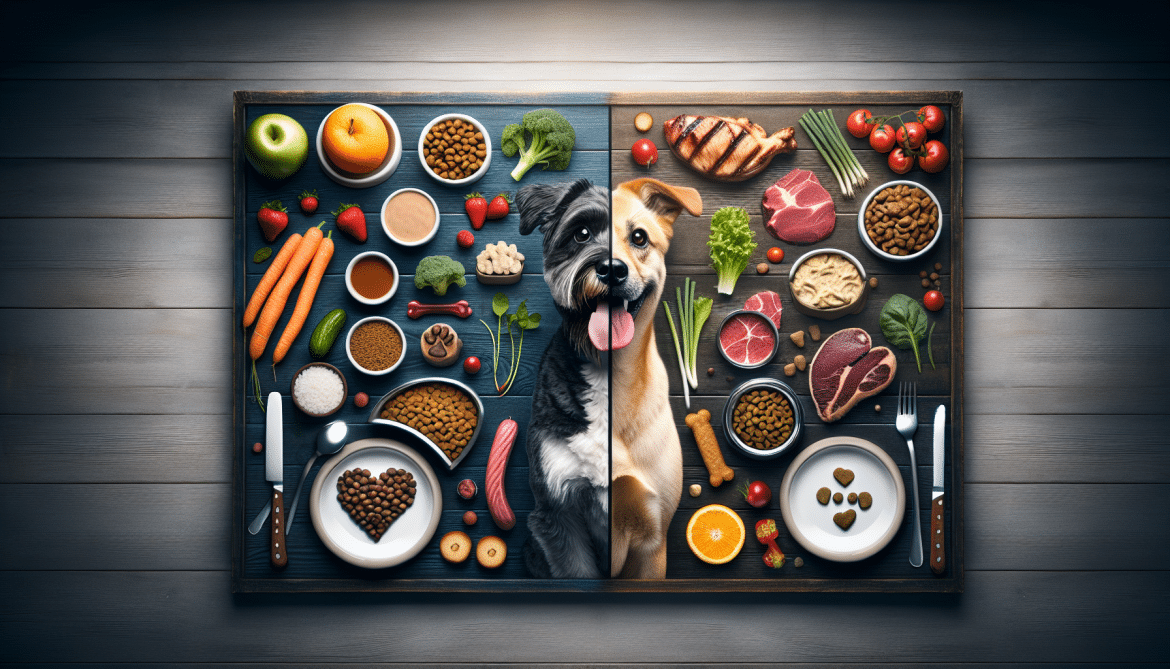If you've ever wondered just how important diet is for your furry friend's health and well-being, look no further! We all want the best for our dogs, and understanding the impact their diet has on their overall health is crucial. From energy levels and coat condition to digestive health and disease prevention, what your dog eats plays a significant role in their overall well-being. In this article, we'll explore the various ways diet affects dogs and why making informed food choices is essential for keeping your four-legged companion happy and healthy. Whether you're a seasoned dog owner or a newbie, get ready to learn some fascinating facts about the power of nutrition for our beloved pets!

This image is property of images.pexels.com.
The Importance of a Healthy Diet
A healthy diet is essential for the overall health and well-being of your dog. Just like humans, dogs also require a well-balanced and nutritious diet to thrive. Proper nutrition plays a crucial role in preventing various health issues and ensuring that your furry friend leads a happy and active life.
Nutritional requirements of dogs
To provide the best care for your dog, it is important to understand their specific nutritional requirements. Dogs are omnivores, meaning they require a combination of proteins, carbohydrates, fats, vitamins, minerals, and water to meet their dietary needs. Each nutrient serves a unique purpose in maintaining their health and supporting their bodily functions.
Effects of a poor diet on dogs
A poor diet can have detrimental effects on your dog's health. Dogs that are not provided with a balanced diet may experience a range of health problems. One of the most common issues is malnutrition, which can lead to weight loss, muscle loss, and a weak immune system. Additionally, a poor diet can increase the risk of developing certain diseases and conditions, such as obesity, joint problems, heart disease, and diabetes.
Benefits of a balanced diet
Feeding your dog a balanced diet has numerous benefits. A well-balanced diet promotes optimal growth and development, enhances energy levels, and helps maintain a healthy weight. Additionally, a nutritious diet can contribute to a shiny coat, healthy skin, and strong teeth. Moreover, a balanced diet strengthens their immune system, making them less susceptible to illnesses and infections. By providing your dog with the right nutrients, you can help them lead a long, healthy, and happy life.
Key Nutrients for Dog Health
In order to meet their nutritional needs, dogs require a variety of key nutrients. Let's explore the importance of each of these nutrients:
Protein
Proteins are the building blocks of your dog's body. They are essential for the growth and repair of tissues, production of enzymes and hormones, and overall maintenance of a healthy immune system. High-quality sources of protein include meat, fish, eggs, and dairy products.
Carbohydrates
Carbohydrates provide a source of energy for your dog. They can be found in various forms, including grains, vegetables, and fruits. While dogs can survive without carbohydrates, a moderate amount can be beneficial for their overall health and vitality.
Fats
Fats are an important energy source for dogs and also play a vital role in maintaining healthy skin, promoting a shiny coat, and supporting brain function. Good sources of fats include animal fats, fish oil, and plant-based oils.
Vitamins
Vitamins are necessary for various bodily functions, such as cell growth, vision, and immune system support. Dogs require both fat-soluble vitamins (A, D, E, and K) and water-soluble vitamins (B vitamins and vitamin C). These vitamins can be obtained from a balanced diet or through supplementation.
Minerals
Minerals are essential for maintaining proper bone health, fluid balance, and nerve function. Some vital minerals for dogs include calcium, phosphorus, potassium, and iron. These can be obtained through a well-rounded diet.
Water
Water is the most important nutrient of all. It is essential for regulating body temperature, digestion, and overall hydration. Provide your dog with fresh, clean water at all times to ensure their well-being.

This image is property of images.pexels.com.
Choosing the Right Dog Food
Choosing the right dog food is crucial for your dog's health. With the plethora of options available, it can be overwhelming to make the best choice. Consider the following factors when selecting a dog food:
Reading the ingredients label
When evaluating a dog food product, always read the ingredients label. Look for high-quality protein sources as the first ingredient, such as real meat or fish. Avoid foods that contain artificial preservatives, flavors, and fillers. Opt for natural and wholesome ingredients that will nourish your dog.
Identifying high-quality dog food
High-quality dog food is formulated to provide the necessary nutrients for your dog's well-being. Look for foods that are labeled as "complete and balanced," as these have undergone testing to meet specific nutritional standards. Additionally, consult with your veterinarian for recommendations on reputable brands.
Consideration for age and breed
Different life stages and breeds have varying nutritional requirements. Choose a dog food that is specifically formulated for your dog's age and breed. Puppies, adult dogs, and senior dogs have different needs, and specialized formulas cater to these specific stages of life.
Special dietary needs
Some dogs may have specific dietary needs or sensitivities. If your dog has allergies or intolerances, consider hypoallergenic or limited ingredient diets. There are also specialized diets available for dogs with medical conditions, such as kidney disease or diabetes. Consulting with your veterinarian will help in determining the best food for your dog's unique needs.
Types of Dog Diets
There are several types of dog diets available, each with its own advantages and considerations. Let's explore a few common options:
Commercial dog food
Commercial dog food is widely available and convenient. It comes in various formulations, including dry kibble, wet/canned food, and semi-moist food. Commercial dog food is formulated to meet specific nutritional standards and can cater to different life stages and dietary needs.
Raw food diet (BARF)
A raw food diet, also known as Biologically Appropriate Raw Food (BARF), consists of uncooked or minimally processed ingredients, such as raw meat, bones, organs, fruits, and vegetables. Advocates of the raw food diet claim that it closely mimics what dogs would consume in the wild. However, it is important to consult with a veterinarian to ensure that this diet meets your dog's individual needs and is safely prepared.
Homemade dog food
Preparing homemade dog food allows you to have full control over the ingredients and quality of your dog's diet. However, it is essential to seek guidance from a veterinary nutritionist to ensure that the homemade diet is nutritionally balanced and meets your dog's specific needs.
Vegetarian and vegan diets
While dogs are primarily carnivorous, it is possible to feed them vegetarian or vegan diets. However, careful consideration and consultation with a veterinarian are necessary to ensure that all required nutrients are provided through non-animal sources. It is crucial to remember that dogs have specific dietary requirements that may not be easily met with a solely plant-based diet.

This image is property of images.pexels.com.
The Effects of Underfeeding
Underfeeding, or not providing enough food for your dog, can have serious consequences on their health. Let's explore some of the effects of underfeeding:
Malnutrition
Underfeeding and inadequate nutrition can lead to malnutrition in dogs. Malnutrition deprives them of essential nutrients, resulting in a variety of health problems. Dogs that are malnourished may experience stunted growth, lack of muscle development, weakened immune systems, and poor organ function.
Weight loss
One of the most noticeable effects of underfeeding is weight loss. When a dog does not receive enough calories to meet their energy requirements, they will start to lose weight. This can lead to a gaunt appearance and a lack of energy.
Muscle loss
Inadequate protein intake can contribute to muscle loss in dogs. Protein is crucial for maintaining and building muscle mass. Without sufficient protein, dogs may experience muscle wasting, decreased strength, and a lack of stamina.
Weak immune system
A poorly nourished dog is more vulnerable to various illnesses and infections due to a weakened immune system. Adequate nutrition is vital for supporting the immune system and helping dogs fight off pathogens and diseases.
The Dangers of Overfeeding
Overfeeding can be detrimental to your dog's health and can contribute to the development of various health issues. Let's explore the dangers of overfeeding:
Obesity
One of the most prevalent issues associated with overfeeding is obesity. Overfeeding can lead to excessive weight gain, placing additional strain on your dog's joints, organs, and overall health. Obesity increases the risk of various health problems, such as diabetes, heart disease, and respiratory issues.
Joint problems
Excessive weight gain due to overfeeding can put undue stress on your dog's joints, leading to joint problems and conditions like arthritis. Joint issues can cause significant pain and discomfort, impacting your dog's mobility and overall quality of life.
Heart disease
Overfeeding, particularly with foods high in fat and calories, can contribute to the development of heart disease in dogs. Excess fat intake can lead to the build-up of plaque in the arteries, increasing the risk of heart-related problems.
Diabetes
Overfeeding and a diet rich in carbohydrates can contribute to the development of diabetes in dogs. An excessive intake of carbohydrates can lead to insulin resistance, making it difficult for the body to regulate blood sugar levels. Diabetes can lead to various complications if not properly managed.

Common Dietary Issues in Dogs
Dogs can experience various dietary issues that can impact their overall health and well-being. Let's explore a few common dietary issues:
Allergies
Dogs can develop allergies to certain ingredients in their diet, resulting in skin issues, gastrointestinal problems, and itching. Common food allergens for dogs include beef, chicken, dairy, wheat, and soy. Identifying and eliminating these allergens from their diet is crucial for symptom relief.
Food intolerances
Similar to allergies, dogs can also have food intolerances where certain ingredients don't agree with their digestive system. This can lead to gastrointestinal distress, such as diarrhea, vomiting, and gas. Identifying and avoiding the specific intolerances is essential for maintaining a healthy digestive system.
Gastrointestinal disorders
Some dogs may have sensitive stomachs or prone to gastrointestinal disorders like gastritis or pancreatitis. These conditions can cause vomiting, diarrhea, and abdominal pain. Specialized diets, under the guidance of a veterinarian, can help manage these disorders and provide sufficient nourishment.
Special Diets for Specific Health Conditions
In addition to general dietary considerations, some dogs may require special diets to manage specific health conditions. Let's explore a few examples:
Weight management diets
Dogs that are overweight or obese benefit from specially formulated weight management diets. These diets are typically lower in calories, higher in fiber, and balanced to promote weight loss in a healthy manner. A gradual weight loss plan under the guidance of a veterinarian can help your dog achieve a healthier weight.
Senior dog diets
As dogs age, their nutritional needs change. Senior dog diets are formulated to support the aging process and address common issues associated with age, such as joint problems, reduced metabolism, and cognitive decline. These diets are typically lower in calories and higher in joint-supporting nutrients.
Puppy diets
Puppies have unique nutritional requirements to support their rapid growth and development. Specialized puppy diets provide the right balance of nutrients, including higher levels of protein and calcium. It is important to feed puppies a diet specifically formulated for their needs to ensure they grow into healthy adults.
Food for dogs with allergies
Dogs with allergies require special diets that eliminate the allergens triggering their symptoms. Hypoallergenic diets, either using novel protein sources or hydrolyzed proteins, can help manage allergies and provide the necessary nutrition without triggering allergic reactions.

The Role of Supplements
While a balanced diet should provide all the necessary nutrients, there are instances where supplements may be beneficial. Let's explore a few common types of supplements for dogs:
Multivitamins
Supplementing with a multivitamin can be beneficial if your dog's diet is lacking in certain vitamins. However, it is important to consult with a veterinarian before adding any supplements to your dog's diet, as excess amounts can be harmful.
Probiotics
Probiotic supplements contain beneficial bacteria that help support a healthy digestive system. They can be particularly beneficial for dogs with gastrointestinal issues or those who have been on antibiotics.
Omega-3 fatty acids
Omega-3 fatty acids, found in fish oil supplements, have anti-inflammatory properties and contribute to healthy skin, a shiny coat, and joint health. These supplements can be beneficial for maintaining optimal skin and coat condition, especially for dogs with allergies or skin issues.
Glucosamine and chondroitin
Glucosamine and chondroitin supplements are commonly used for joint support in dogs, especially those with arthritis or age-related joint issues. These supplements can help reduce inflammation and support the health and mobility of your dog's joints.
The Benefits of a Healthy Diet
Feeding your dog a healthy diet has a myriad of benefits. Let's explore some of the key advantages:
Improved energy levels
A well-balanced diet provides your dog with the energy they need to stay active and engaged throughout the day. By fueling their body with quality nutrients, you can ensure that they have the energy to enjoy walks, playtime, and other activities.
Healthy skin and coat
A nutritious diet contributes to healthy skin and a shiny coat. Essential fatty acids, like omega-3 and omega-6, found in quality proteins and fats, promote skin health, reduce itching and inflammation, and provide a lustrous coat. A proper diet can also minimize skin allergies and irritations.
Stronger immune system
Proper nutrition supports a strong immune system, helping your dog fight off infections and diseases. Nutrients like vitamins, minerals, and antioxidants found in a balanced diet enhance the immune response, ensuring that your dog stays healthy and resilient.
Better digestion
A well-balanced diet that includes adequate fiber promotes healthy digestion in dogs. High-quality fibers aid in regular bowel movements, preventing constipation or diarrhea. Additionally, a healthy digestive system promotes nutrient absorption and overall gut health.
By understanding the importance of a healthy diet and providing your dog with a well-balanced and nutritious feeding regimen, you are actively contributing to their overall health and well-being. Remember to consult with a veterinarian for guidance in selecting the best diet plan and to address any specific dietary concerns for your furry friend.



5 comments
[…] your trip, it’s essential to stay mindful of your dog’s well-being and monitor their behavior and overall health. Take regular breaks to allow your dog to stretch their legs, go to the bathroom, and stay […]
[…] Diet plays a crucial role in your dog’s overall health, including their dental well-being. Feeding your dog a nutritious diet that consists of high-quality ingredients can contribute to maintaining good oral health. Avoiding excessive amounts of sugary foods and treats can help prevent tooth decay and gum disease. Additionally, incorporating dental-specific diets or dental chews into your dog’s routine can enhance their oral hygiene and reduce the risk of dental issues. […]
[…] health problems often arise as a result of a chronic condition in dogs. For example, dogs with diabetes may be more prone to urinary tract infections. […]
[…] like fleas, ticks, and heartworms. These preventive treatments are crucial in safeguarding your dog’s health and well-being, as they reduce the risk of your pet contracting these harmful […]
[…] nutrition is essential for maintaining your dog's overall health and well-being. Just like humans, dogs require a balanced diet that provides them with the necessary nutrients to […]
Comments are closed.